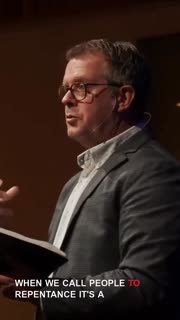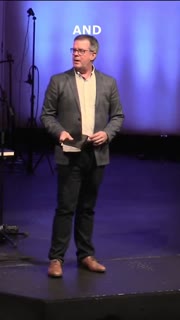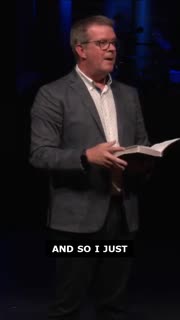Transformative Grace: Lessons from Jacob's Family
Devotional
Sermon Summary
Bible Study Guide
Sermon Clips
1. "Oh, that we would have Jacobs in our life who would speak the truth and I don't know if you've got in your life whether it's maybe a mom or a dad, an aunt, an uncle, a co-worker, a friend, somebody that you've journeyed in your faith with in any kind of capacity somebody who's able to speak into your life you've probably had those moments along the way where somebody has spoken truth in a gentle way sometimes it's not so gentle but it's always nice at least I like it when they do it gently but it changes the trajectory of where you're going." [41:55] (38 seconds)
2. "When we call people to repentance it's a gift of grace because repentance is turning from sin and turning toward God and his grace that he would extend to us and so this is the life of a prophet and so what we're going to see is Jacob takes the of a prophet in other words foretelling speaking and giving perspective to the circumstances that these 12 sons of his have sort of the situations they've gotten themselves into and so that's the background so he's prophet he's blessing there's a lot happening here." [50:05] (40 seconds)
3. "And God's just saying, for your flourishing, I'm putting these boundaries around this. And I think if we're honest, when we begin to, again, if we were to have a conversation about our families, each of our families could describe an event that created such turmoil. And oh, that we would recognize that God's boundaries around sexual intimacy is not because he's angry with us or he's angry about sin, but he's just saying, I want to create flourishing for you and your family." [58:15] (36 seconds)
4. "And so I just say today, if you're feeling the turmoil of sexual immorality within you, oh, that you would know that God is there. You would know the power of God's grace that we're going to talk about in just a few moments. But before we get to God's grace, I stop here and look to now the next two brothers. And the next two brothers are both mentioned simultaneously. It's the only time Jacob does this. So he, you know, Reuben, oldest, he loses his birthright. And so we've got, you know, coming up next, we've got Simeon and Levi. And we think, well, are one of those two going to be the ones that take the family name forward? Well, we see they've got some problems as well." [01:00:45] (43 seconds)
5. "And so what we want to understand is that we need to guard against your anger turning you toward spiritual bondage. That you guard against your anger turning you toward spiritual bondage. So now we carry on. Verse 5, it says, So Simeon and Levi are brothers. Their swords are weapons of violence. Let me not enter their council. Let me not join their assembly. For they have killed men in their anger. And hamstrung oxen as they pleased. Cursed be the anger. And you notice Jacob isn't cursing them. He's cursing their anger. He's identifying this trait that had become rooted within them." [01:01:29] (45 seconds)
6. "And so Judah's blessing wasn't because he had his whole life together, but he had postured himself in a way, to receive the grace of God and the forgiveness of God that would extend to him that would keep the scepter in his hand, but keep a life of abundance something that he lived out. And this lion of the this lion cub this lioness that was right made reference to going into the book of Revelation. We see the worship of that that lion of the tribe of Judah. When no one could open the scrolls of the seals, of God's coming judgment, when they couldn't open this that the scrolls of this the seals in Revelation 5." [01:17:00] (45 seconds)
7. "So we're going to stop there. Jacob spoke into the life of his sons some hard truths. Who's your Jacob? To whom are you a Jacob for? And we don't come into a position of and saying well, I've got my life together. So let me help you get yours life together. But rather that image of one beggar telling another beggar where they found some bread and all that we could be that kind of posture have that kind of posture as we are Jacob's to the people around us. Extending the grace of God as it would be fully revealed in Jesus Christ because Ephesians 2 says for it is by grace. You have been saved through faith and this not from yourselves. It is a gift of God not by works so that no one can boast and yeah God because you use people like Judah to extend your blessing." [01:19:00] (59 seconds)
8. "I don't know. Maybe you're living in a posture of turmoil. Maybe you've got anger has rooted itself so deeply in your life that it's a it's a bondage, but I don't want to leave you there. I believe that there is Grace that is found in the person in the work of Jesus Christ. The lion of the tribe of Judah can open the seals. Around us and reveal to us and forgive us of the sin the hope of the gospel being revealed to us through a word of an old man who is getting ready to die or that you would receive his word to you that the lion of the tribe of Judah has come Shiloh is here that the manifest presence of God is a prayer away for each of us. Who's your Jacob? Who you Jacob for let's pray father." [01:20:12] (61 seconds)
Ask a question about this sermon
2. "When we call people to repentance it's a gift of grace because repentance is turning from sin and turning toward God and his grace that he would extend to us and so this is the life of a prophet and so what we're going to see is Jacob takes the of a prophet in other words foretelling speaking and giving perspective to the circumstances that these 12 sons of his have sort of the situations they've gotten themselves into and so that's the background so he's prophet he's blessing there's a lot happening here." [50:05] (40 seconds)
3. "And God's just saying, for your flourishing, I'm putting these boundaries around this. And I think if we're honest, when we begin to, again, if we were to have a conversation about our families, each of our families could describe an event that created such turmoil. And oh, that we would recognize that God's boundaries around sexual intimacy is not because he's angry with us or he's angry about sin, but he's just saying, I want to create flourishing for you and your family." [58:15] (36 seconds)
4. "And so I just say today, if you're feeling the turmoil of sexual immorality within you, oh, that you would know that God is there. You would know the power of God's grace that we're going to talk about in just a few moments. But before we get to God's grace, I stop here and look to now the next two brothers. And the next two brothers are both mentioned simultaneously. It's the only time Jacob does this. So he, you know, Reuben, oldest, he loses his birthright. And so we've got, you know, coming up next, we've got Simeon and Levi. And we think, well, are one of those two going to be the ones that take the family name forward? Well, we see they've got some problems as well." [01:00:45] (43 seconds)
5. "And so what we want to understand is that we need to guard against your anger turning you toward spiritual bondage. That you guard against your anger turning you toward spiritual bondage. So now we carry on. Verse 5, it says, So Simeon and Levi are brothers. Their swords are weapons of violence. Let me not enter their council. Let me not join their assembly. For they have killed men in their anger. And hamstrung oxen as they pleased. Cursed be the anger. And you notice Jacob isn't cursing them. He's cursing their anger. He's identifying this trait that had become rooted within them." [01:01:29] (45 seconds)
6. "And so Judah's blessing wasn't because he had his whole life together, but he had postured himself in a way, to receive the grace of God and the forgiveness of God that would extend to him that would keep the scepter in his hand, but keep a life of abundance something that he lived out. And this lion of the this lion cub this lioness that was right made reference to going into the book of Revelation. We see the worship of that that lion of the tribe of Judah. When no one could open the scrolls of the seals, of God's coming judgment, when they couldn't open this that the scrolls of this the seals in Revelation 5." [01:17:00] (45 seconds)
7. "So we're going to stop there. Jacob spoke into the life of his sons some hard truths. Who's your Jacob? To whom are you a Jacob for? And we don't come into a position of and saying well, I've got my life together. So let me help you get yours life together. But rather that image of one beggar telling another beggar where they found some bread and all that we could be that kind of posture have that kind of posture as we are Jacob's to the people around us. Extending the grace of God as it would be fully revealed in Jesus Christ because Ephesians 2 says for it is by grace. You have been saved through faith and this not from yourselves. It is a gift of God not by works so that no one can boast and yeah God because you use people like Judah to extend your blessing." [01:19:00] (59 seconds)
8. "I don't know. Maybe you're living in a posture of turmoil. Maybe you've got anger has rooted itself so deeply in your life that it's a it's a bondage, but I don't want to leave you there. I believe that there is Grace that is found in the person in the work of Jesus Christ. The lion of the tribe of Judah can open the seals. Around us and reveal to us and forgive us of the sin the hope of the gospel being revealed to us through a word of an old man who is getting ready to die or that you would receive his word to you that the lion of the tribe of Judah has come Shiloh is here that the manifest presence of God is a prayer away for each of us. Who's your Jacob? Who you Jacob for let's pray father." [01:20:12] (61 seconds)








